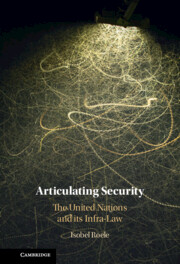Book contents
- Articulating Security
- Articulating Security
- Copyright page
- Contents
- Acknowledgements
- Additional material
- 1 Introduction
- Part I The UN’s Mechanics of Managerial Governance
- 2 An Articulated Security Project
- 3 Strategic Planning
- 4 Performance Review
- Part II The Stakes for Law: Between Compositional Articulation and the Articulation of Injustice
- Select Bibliography
- Index
2 - An Articulated Security Project
from Part I - The UN’s Mechanics of Managerial Governance
Published online by Cambridge University Press: 03 March 2022
- Articulating Security
- Articulating Security
- Copyright page
- Contents
- Acknowledgements
- Additional material
- 1 Introduction
- Part I The UN’s Mechanics of Managerial Governance
- 2 An Articulated Security Project
- 3 Strategic Planning
- 4 Performance Review
- Part II The Stakes for Law: Between Compositional Articulation and the Articulation of Injustice
- Select Bibliography
- Index
Summary
This chapter introduces the UN’s principal approach to dealing with ‘threats without boundaries’, a category that includes terrorism, pandemic disease, WMD proliferation, and organized crime. The UN harnesses managerial governance as a way of countering these threats without resorting to unilateral, militarized responses like the War on Terror. The UN conceptualizes the threats as interdependence problems which call for a joined-up response. The chapter reveals the symmetry of threat and response, showing how each is articulated in three dimensions. First, the transboundary flow of threats calls for multilateral cooperation in response; second, the interconnection of the threats, which aggravate and incubate one another, calls for a comprehensive response; and third, the attribution of a life-span to threats without boundaries, which are serried into emergent, manifest, and residual stages, calls for a continuous response. Managerial governance, the chapter concludes, is produced through the imperative to organize attendant on the complexity that accumulates in a project that is cooperative, comprehensive and continuous.
Information
- Type
- Chapter
- Information
- Articulating SecurityThe United Nations and its Infra-Law, pp. 29 - 56Publisher: Cambridge University PressPrint publication year: 2022
